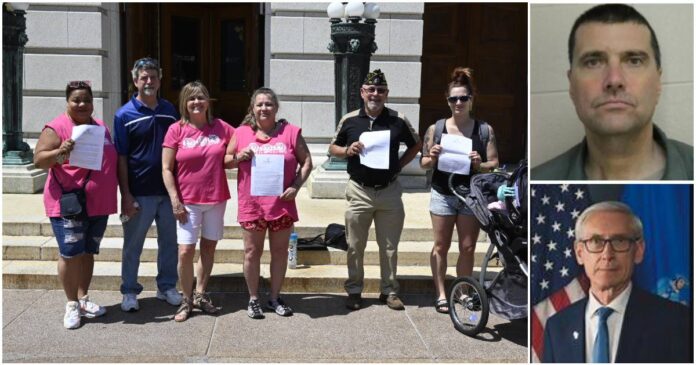Gov. Tony Evers split from his appointee to the Wisconsin Parole Commission Friday, writing a letter to Chairman John Tate that requests the “immediate and expeditious reconsideration” of Tate’s decision to grant early release to wife-killer Douglas Balsewicz.
The action comes after days of pressure from the family of Balsewicz’s victim, Johanna Rose. The determined family passionately and persistently pushed the governor to “do the right thing” and urge Tate to reverse himself before Balsewicz’s May 17, 2022, release date.
“I do not agree with this decision, and I have considerable concerns regarding whether Johanna’s family was afforded sufficient opportunity to voice their memories, perspectives, and concerns before this decision was made,” Evers wrote after an hour-long meeting with multiple members of the victim’s family in his Capitol office.
However, Evers has not indicated that he is firing Tate, as the family requested.
Wisconsin Right Now obtained a copy of the letter from the family.
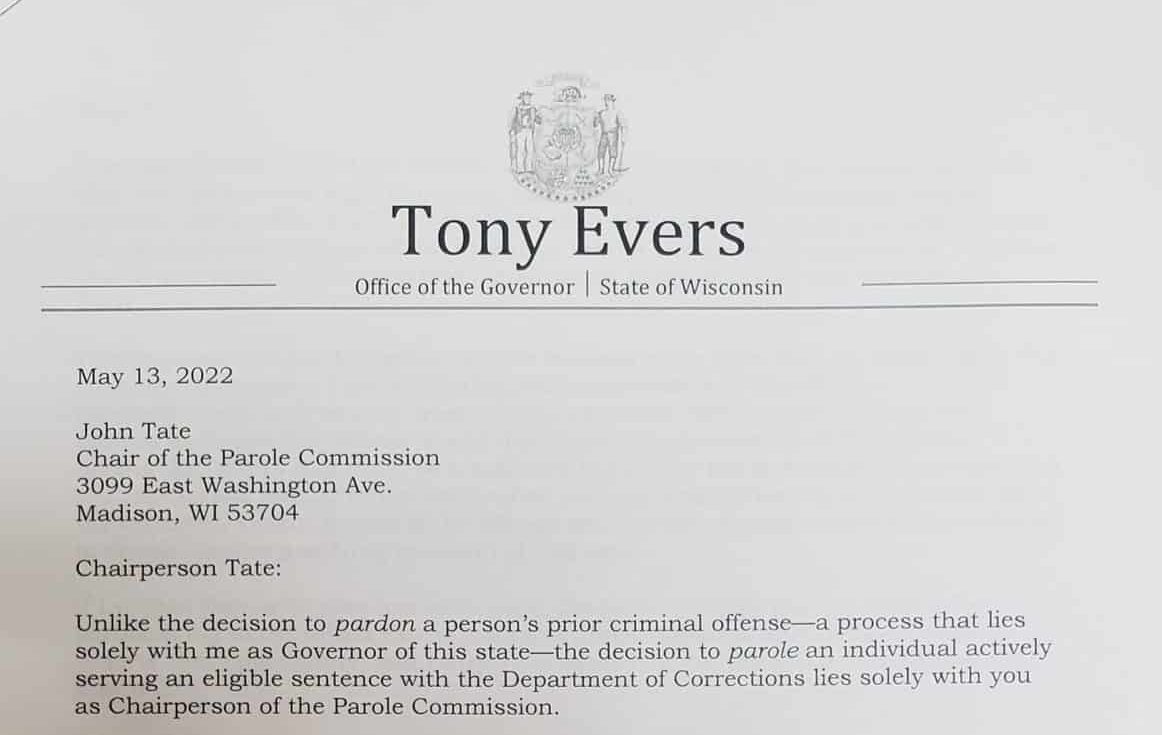
“I understand Douglas Balsewicz is to be released on or after May 17, 2022. Given this compressed timeline, I am requesting your immediate and expeditious reconsideration to determine whether this additional victim input changes your opinion as to whether release would depreciate the seriousness of this offense,” Evers wrote. “Among the factors that must be considered is whether the questions raised regarding the appropriate level of victim notification and opportunity for input – especially given the extremely violent nature of the offense and relative recency – constitutes a chance in circumstances justifying recission at this time.”
Concluded Evers, in the signed letter, “If Douglas Balsewicz goes free next week, the victim’s family may be deprived of participating to the fullest extent justice requires. Johanna and Johanna’s family deserve that opportunity, and I urge your immediate reconsideration to ensure that they do.”
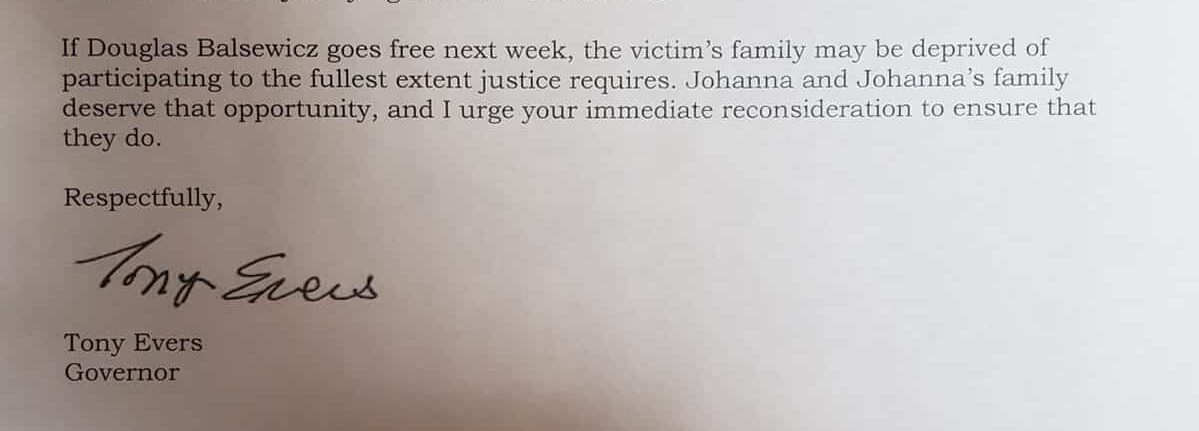 On May 10, Tate, a Racine alderman, told the Racine Journal-Times, in his only comments on the parole decision, that he was not reversing the decision, citing in part concerns the state would be sued. The family is optimistic, however, that he will rescind it now, in the wake of Evers’ letter. According to the family, they were told that, if Tate does decide there is a reason to rescind the decision, he would have to articulate the change in circumstances at an administrative law hearing to give Balsewicz due process, but then it would go back to Tate for a final decision.
On May 10, Tate, a Racine alderman, told the Racine Journal-Times, in his only comments on the parole decision, that he was not reversing the decision, citing in part concerns the state would be sued. The family is optimistic, however, that he will rescind it now, in the wake of Evers’ letter. According to the family, they were told that, if Tate does decide there is a reason to rescind the decision, he would have to articulate the change in circumstances at an administrative law hearing to give Balsewicz due process, but then it would go back to Tate for a final decision.
We called the Wisconsin Parole Commission to speak with Tate but did not hear back. His cell phone has a message saying he does not respond to calls about parole issues. We also called a number on the letter he belatedly sent the family revealing Balsewicz was being released. The receptionist who answered did not know who he was. The family has tried in vain to speak with Tate. They also spent days trying to reach Evers, and were told by a staff member that he would call him earlier in the week, but he never did. They then went to his Capitol office on Thursday to ask for a meeting and met with his chief-of-staff Maggie Gau. Shortly after that meeting, they had a date and time to talk to the governor.
“I think it’s very wrong what Tate did,” Nikkole Nelson said. She was 2 years old in 1997 when her father stabbed her mother to death in front of Nikkole and her brother Christopher, who was 4. Balsewicz left the two children with their dying mother and went to Taco Bell. Nikkole and Christopher were later discovered by a neighbor walking down the street holding hands, Nikkole in a diaper, and covered with their mother’s blood. Today, Nikkole is thriving, a young mother. Christopher, tragically, died in a car crash at age 26. Evers met with Nikkole, two of Johanna’s sisters, her brother, niece, and brother-in-law.
Nikkole was not notified of the parole hearing, the family said, which they said troubled Evers.
“Our family didn’t just talk about JoJo,” Johanna’s niece Theresa Cook said. “Our family demanded that the governor rethink this (parole) grant program to not include first and second-degree murderers, to give victims’ families more than 7 days to respond to the release of a violent offender, and we asked him… to look through the list of those who have recently been given this (parole/early release) grant and be sure you have respected the dignity of the rest of the victims.”
Evers’ appointee, John Tate, telegraphed long ago how he saw the Parole Commission chairman’s role. He has openly championed releasing more inmates on parole and made anti-police comments on Twitter. He’s a failed Assembly candidate who worked on a Democratic congressional race. On LinkedIn, he describes himself as a “founding member” of Our Wisconsin Revolution. That’s a group that openly works to end “truth-in-sentencing laws,” mandatory minimum sentences, and other tough-on-criminals measures.
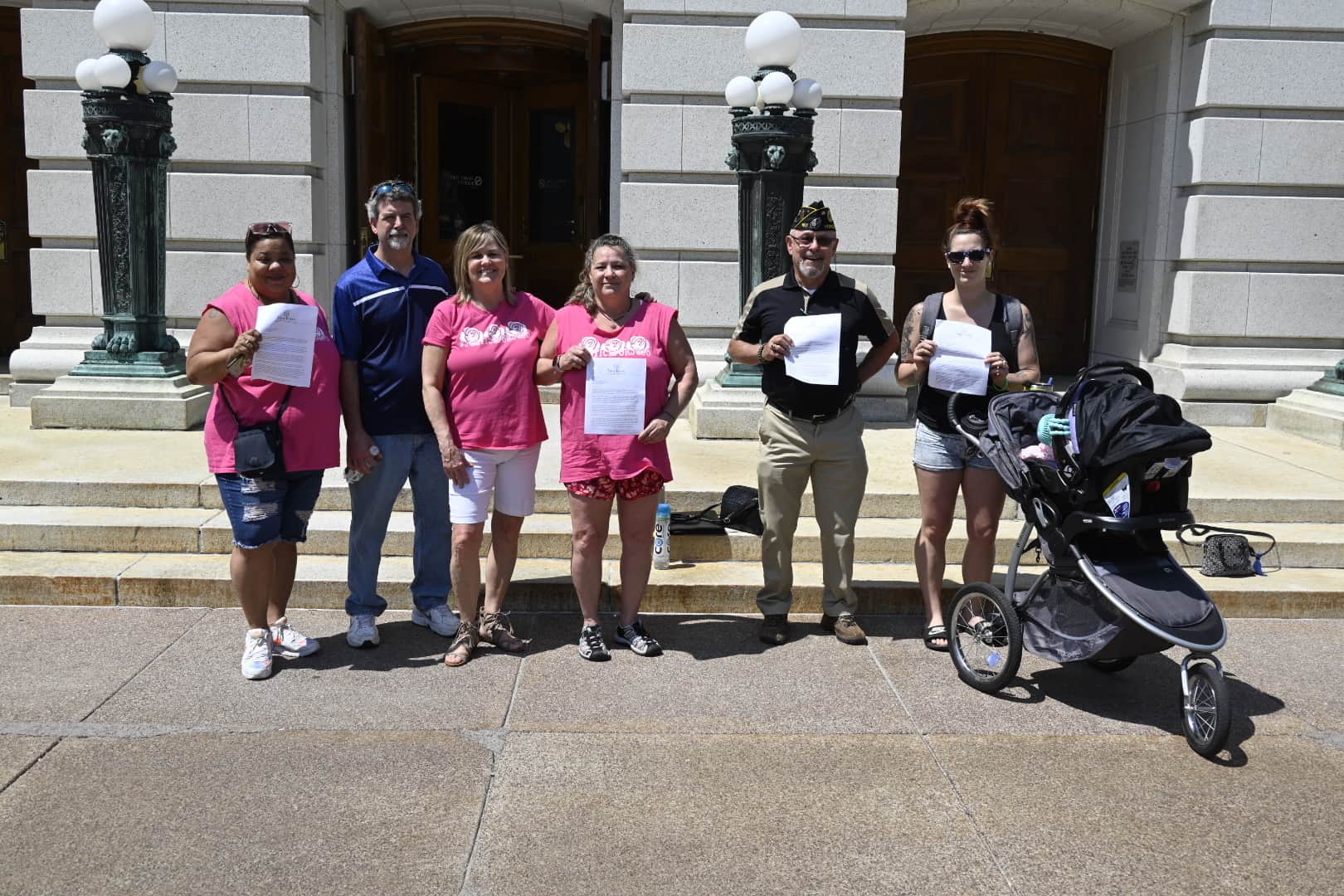
The family left the Capitol with wide smiles at last after days of devastation and pain over the pending release of Balsewicz, who stabbed his wife 42 times in 1997. In late April, Tate had agreed to release Balsewicz after almost 25 years of an 80-year sentence even though the judge, Diane Sykes, had said in 1997 that he would not be an appropriate candidate for early release. Republican candidates for governor, Kevin Nicholson, Tim Michels, and Rebecca Kleefisch also put pressure on the governor to act, saying the parole should be revoked and decrying the decision.
The non-partisan Legislative Reference Bureau confirmed in response to a request from WRN, “Relevant provisions of the administrative code authorize the withdrawal of a parole recommendation and the rescission of a grant of parole prior to release, provided a change in circumstances require such a withdrawal or rescission.”
The governor’s letter makes it clear that the change in circumstances involves failure to notify relatives properly of the parole hearing and release. The family on Thursday received a letter from Tate, stating that Balsewicz was being paroled. It was postmarked May 10, but is dated April 30. They learned he was being released through the grapevine.
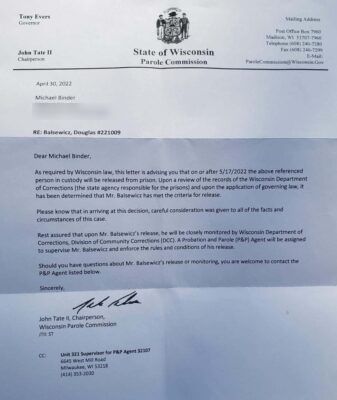
 Evers’ letter cites problems with notification for his stance against the release. For days, the governor’s office had said only that Evers did not have authority to reverse Tate, and Evers walked away from reporters on Thursday night who asked him about the case.
Evers’ letter cites problems with notification for his stance against the release. For days, the governor’s office had said only that Evers did not have authority to reverse Tate, and Evers walked away from reporters on Thursday night who asked him about the case.
The letter dated May 13, 2022 states, “It is in light of this conversation (with the family) that I write to you today. While I do not have the authority to overrule your decision in this case, I must implore you to reconsider.”
However, after meeting with the emotional and heartbroken family, the governor, within a half-hour, had sent Tate the strongly worded letter. “This case is disturbing and horrific, and the magnitude of this tragedy rippled through Johanna’s family – the effects of which they endure still day.”
Evers appointed Tate to run the Parole Commission in 2019. In a press release at that time, he said, “Improving our parole system is an important part of reforming our criminal justice system and eliminating the racial disparities that have led to increased incarceration rates for people of color. I know that John Tate II will be a strong advocate for the change we need to ensure our criminal justice system treats everyone fairly and focuses on rehabilitation. We can improve public safety and empower returning citizens at the same time.” When he ran for election the first time, Evers promised to cut the state’s prison population in half.
The governor wrote Tate, “In recent days, members of Johanna’s immediate family have appealed to me directly, asking for a meeting with my staff and me. Today, I had the opportunity to speak directly with them and heard firsthand about the weight of the grief, trauma, and anxiety they carry every day. I also heard about their concerns throughout this recent parole process, including a lack of transparency, accountability, and notification, causing more trauma and pain for Johanna’s family.”
“It’s promising. We have hope today,” Karen Kannenberg, Johanna’s sister, said when the family emerged from the governor’s office. They said the governor told them there were “mistakes made.”
“We have faith in Gov. Evers,” Theresa Cook, Johanna’s niece, said. Cook had revealed in a meeting the previous day with Evers’ chief-of-staff Maggie Gau that she was a union member who voted for Evers but was now questioning her vote. She emerged from this meeting with a smile on her face and praising the governor. You can see video from the Gau meeting with the family here.
“You haven’t seen us look like this in quite a while. We are hopeful that John Tate II is going to do the right thing.” The governor said he did not want to “make this political,” said Kim Binder Cornils, Johanna’s sister. “That this was about us and JoJo, and he even got emotional.”
Evers noted, “I have often spoken out forgiveness and the power of redemption – values I know Johanna’s family and I both share. I also believe, however, and Wisconsin state law agrees, that the voices, experiences and trauma of victims of crimes must weigh heavily in these conversations and deserve full and meaningful consideration. Justice simply demands it.”
Evers wrote Tate, “Our constitution states that victims have a right to be heard. Our statutes reiterate that victims have the right to provide direct input in the parole decision-making process. Section PAC 1.07(7) of the Wisconsin Administrative Code provides that you can rescind your decision where there has been a change in circumstances. I implore you to look again at this case, and, importantly, to do so swiftly and without any delay.”
He wrote:
Cook wants people to remember Balsewicz, “Her laughter was contagious. She was brave, she was smart, she was a good mother and citizen, and she deserved so much more for this, but today this is for her.”
On Thursday, we contacted the non-partisan Legislative Reference Bureau to ask questions about the governor’s authority. We received these answers:
Does the governor have the authority to overrule a parole commission decision? Did Gov. Tommy Thompson do that?
Under Wis. Stat. § 304.01 (1), the chairperson of the parole commission “shall be the final parole-granting authority, except as provided in s. 304.02.” Wis. Stat. § 304.02 provides for special action parole release. Under this section, DOC must use a special action release program to relieve crowding in state prisons by releasing certain prisoners to parole supervision. Also under this section, DOC must promulgate rules for this program, including procedures for the secretary to decide whether to grant a prisoner a special action release to parole supervision.
The statutes do not authorize the governor to overrule a decision of the parole commission chairperson relating to parole or the secretary of DOC relating to special action parole release.
To the best of our knowledge, Governor Tommy Thompson never overruled the decision of a parole commission chairperson. In 1994, Governor Thompson directed the secretary of DOC to block the release of violent offenders, however, a court of appeals subsequently ruled that this letter did not have the force of law. (See State v. Delaney.)
Can a parole commission chair reverse their own decision?
The statutes do not authorize the parole commission to withdraw or rescind a decision. Under certain circumstances, including an alleged violation of a condition or rule of parole, parole may be revoked pursuant to an administrative hearing. (See Wis. Stat. § 304.06 (3).)
Relevant provisions of the administrative code authorize the withdrawal of a parole recommendation and the rescission of a grant of parole prior to release, provided a change in circumstances require such a withdrawal or rescission.
Per Wis. Admin Code. § PAC 1.07 (6), a commissioner may withdraw a recommendation for parole prior to the issuance of the grant of parole whenever the circumstances affecting the original recommendation have, in the opinion of the commissioner, changed sufficiently to require withdrawal of the recommendation.
Per Wis. Admin Code § PAC 1.07 (7), if there is a change in circumstances requiring a denial of the grant of parole subsequent to the issuance of a parole grant but prior to release, the inmate must be provided written notice of the reasons for rescission and a summary of the evidence supporting the reasons for rescission. This subsection requires that the inmate be given an opportunity to appear and be heard by an impartial hearing examiner from the Division of Hearings and Appeals in the Department of Administration and establishes requirements for such a hearing. After a review of the findings of fact, conclusions of law, and recommendations of the hearing examiner, the chairperson must make a final decision.
Does the governor have the power to suspend all paroles, including someone like Balsewicz, who has been paroled but not yet released into the community?
No. The statutes do not authorize the governor to grant, deny, or suspend parole.
Evers banned the press from attending the Friday meeting, against the family’s wishes.
In 2019, Wisconsin Public Radio reported that Evers had appointed Tate, a Racine social worker and alderman to chair the Wisconsin Parole Commission.
“Tate said he’s also interested in increasing the number of paroles granted by the commission,” the article says. That article noted that “prison reform advocates” had criticized former Republican Gov. Scott Walker and his Parole Commission for “greatly reducing the number of inmates being released under the old laws” to 865 out of 9,985 who attempted it.


